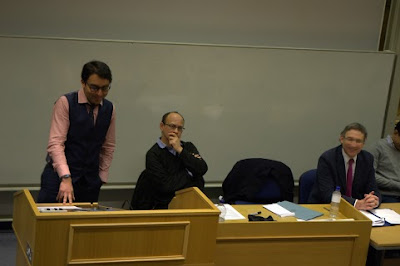This is the fourth in a series of such meetings, on topics of interest to people from all sorts of communities across the city. I've posted on this blog about the three earlier meetings:
- Faith in Family, 20 November 2012
- God in My Faith, 13 March 2012
- Open Meeting with City Mayor, 31 January 2012
Despite extensive preparations for this evening, we haven't produced signage (note to self: do that for any future meetings we hold on campus), and it's easy to miss the entrance to Lecture Theatre 3 in the Ken Edwards Building if you haven't been here before. So I spend the first half hour outside at the top of the pathway, rounding up stragglers. It's cold (the gritters are out already) but worth it, as I redirect more than half a dozen people who appear to have missed the venue - including one of the speakers.
A panel of four distinguished, experienced and knowledgeable speakers have been invited to address the topics of Hate Crime and the Criminal Justice System from their own perspectives (professional and personal), then answer questions from the audience. Each of the speakers had a different perspective to offer (professional and personal) and it would be fair to say that not all of the speakers agreed on how these such crimes - and the underlying attitudes that allow them to persist - are treated in society. But such differences of opinion and approach are aired in a courteous manner and lead to some thought-provoking discussion.
 |
| Detective Superintendent David Sandall at the podium |
First speaker: Detective Superintendent David Sandall, Head of Safeguarding and Lead for Hate Crime, Leicestershire Police.
 |
| Neil Chakroborti at the podium |
Second speaker: Neil Chakroborti, Senior Lecturer in Criminology, University of Leicester and Director of the Leicester Hate Crime Project.
Third speaker: Chino Cabon, Senior Race Equality Officer, The Race Equality Centre - demonstrating his mastery of the double karate chop emphasis there.
Fourth and final speaker: Luman Ali, Secretary, Federation of Muslim Organisations. Luman stepped in at late notice for Suleman Nagdi, Chair of the Muslim Burial Council for Leicestershire and PR Officer for FMO.
The Rt Revd Tim Stevens, Bishop of Leicester, had accepted the invitation to chair the meeting, but has to withdraw, due to ill health. Tony Nelson, who had taken responsibility for organising the meeting, chaired in Bishop Tim's stead. Tony (who represents the Leicester Hebrew Congregation on Leicester Council of Faiths) is in the centre of the photo below, flanked by the speakers.
There are 50 attendees (not counting the speakers and chair), many of them representing communities, groups and organisations with first hand experience of crimes committed against their members on account of disability, race, religion, sex or sexual orientation among a variety of reasons. More than one person spoke about the effect of belonging to a group which has been unfairly accused of perpetrating hate crime.
Light refreshments are served at the end of the meeting, allowing attendees to mix, mingle and network for a further half hour. Another note to self: take greater care to clean up after eating oily finger food. When putting away our generic pop-up banner, the thing slips from my grasp and takes a bit of a doing, leaving some visible damage. That's the first such hit that any of our banners has taken in more than four years of regular use.
We're grateful to those agencies which backed up this event with their own personnel, resources and time, such as Victim Support, whose display is shown above.
All photos posted here were taken by Ambrose Musiyiwa (Civic Leicester). Ambrose recorded two videos of the proceedings this evening: one of the main presentations by the four speakers and one of the Q&A that followed them. They are now available on YouTube. Our thanks got to Ambrose for his tireless support!
Light refreshments are served at the end of the meeting, allowing attendees to mix, mingle and network for a further half hour. Another note to self: take greater care to clean up after eating oily finger food. When putting away our generic pop-up banner, the thing slips from my grasp and takes a bit of a doing, leaving some visible damage. That's the first such hit that any of our banners has taken in more than four years of regular use.
All photos posted here were taken by Ambrose Musiyiwa (Civic Leicester). Ambrose recorded two videos of the proceedings this evening: one of the main presentations by the four speakers and one of the Q&A that followed them. They are now available on YouTube. Our thanks got to Ambrose for his tireless support!









